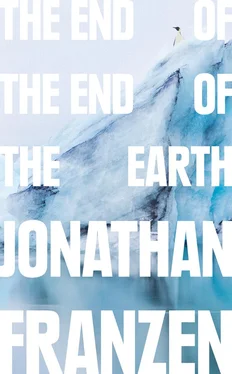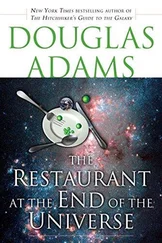After three nights of doubting my character and motives, I called Henry Finder and told him I couldn’t write the piece. I’d done plenty of ranting about climate to my friends and to like-minded conservationists, but it was like a lot of the ranting that happens online, where you’re protected by the impromptu nature of the writing and by the known friendliness of your audience. Trying to write a finished thing, an essay, had made me aware of the sloppiness of my thinking. It had also enormously increased the risk of shame, because the writing wasn’t casual, and because it was going out to an audience of probably hostile strangers. Following Henry’s admonition (“ Therefore ”), I’d come to think of the essayist as a firefighter, whose job, while everyone else is fleeing the flames of shame, is to run straight into them. But I had a lot more to fear now than my mother’s disapproval.
My essay might have stayed abandoned if I hadn’t already clicked a button on Audubon’s website, affirming that, yes, I wanted to join it in fighting climate change. I’d only done this to gather rhetorical ammunition to use against Audubon, but a deluge of direct-mail solicitations had followed from that click. I got at least eight of them in six weeks, all of them asking me to give money, along with a similar deluge in my email in-box. A few days after speaking to Henry, I opened one of the emails and found myself looking at a picture of myself —luckily a flattering image, taken in 2010 for Vogue magazine, which had dressed me up better than I dress myself and posed me in a field with my binoculars, like a birder. The headline of the email was something like “Join Author Jonathan Franzen in Supporting Audubon.” It was true that, a few years earlier, in an interview with Audubon magazine, I’d politely praised the organization, or at least its magazine. But no one had asked for my permission to use my name and image for solicitation. I wasn’t sure the email was even legal.
A more benign impetus to return to the essay came from Henry. As far as I know, Henry couldn’t care less about birds, but he seemed to see something in my argument that our preoccupation with future catastrophes discourages us from tackling solvable environmental problems in the here and now. In an email to me, he gently suggested that I lose the tone of prophetic scorn. “This piece will be more persuasive,” he wrote in another, “if, ironically, it’s more ambivalent, less polemical. You’re not whaling on folks who want us to pay attention to climate change and emission reductions. But you’re attentive to the costs. To what the discourse pushes to the margins.” Email by email, revision by revision, Henry nudged me toward framing the essay not as a denunciation but as a question: How do we find meaning in our actions when the world seems to be coming to an end? Much of the final draft was devoted to a pair of well-conceived regional conservation projects, in Peru and Costa Rica, where the world really is being made a better place, not just for wild plants and wild animals but for the Peruvians and Costa Ricans who live there. Work on these projects is personally meaningful, and the benefits are immediate and tangible.
In writing about the two projects, I hoped that one or two of the big charitable foundations, the ones spending tens of millions of dollars on biodiesel development or on wind farms in Eritrea, might read the piece and consider investing in work that produces tangible results. What I got instead was a missile attack from the liberal silo. I’m not on social media, but my friends reported that I was being called all sorts of names, including “birdbrain” and “climate-change denier.” Tweet-size snippets of my essay, retweeted out of context, made it sound as if I’d proposed that we abandon the effort to reduce carbon emissions, which was the position of the Republican Party, which, by the polarizing logic of online discourse, made me a climate-change denier. In fact, I’m such a climate-science accepter that I don’t even bother having hope for the ice caps. All I’d denied was that a right-minded international elite, meeting in nice hotels around the world, could stop them from melting. This was my crime against orthodoxy. Climate now has such a lock on the liberal imagination that any attempt to change the conversation—even trying to change it to the epic extinction event that human beings are already creating without the help of climate change—amounts to an offense against religion.
I did have sympathy for the climate-change professionals who denounced the essay. They’d been working for decades to raise the alarm in America, and they finally had President Obama on board with them; they had the Paris Accord. It was an inopportune time to point out that drastic global warming is already a done deal, and that it seems unlikely that humanity is going to leave any carbon in the ground, given that, even now, not one country in the world has pledged to do it. I also understood the fury of the alternative-energy industry, which is a business like any other. If you allow that renewable-energy projects are only a moderating tactic, unable to reverse the damage that past carbon emissions will continue to do for centuries, it opens the door to other questions about the business. Like, did we really need quite so many windmills? Did they have to be placed in ecologically sensitive areas? And the solar farms in the Mojave Desert—wouldn’t it make more sense to cover the city of Los Angeles with solar panels and spare the open space? Weren’t we sort of destroying the natural world in order to save it? I believe it was an industry blogger who called me a birdbrain.
As for Audubon, the fund-raising email should have warned me about the character of its management. But I was still surprised by its response to the essay, which was to attack, ad hominem, the person whose name and image it had blithely appropriated two months earlier. My essay had, yes, given Audubon some tough love. I wanted it to cut out the nonsense, stop talking about fifty years from now, and be more aggressive in defending the birds that both it and I love. But apparently all Audubon could see was a threat to its membership numbers and its fund-raising efforts, and so it had to negate me as a person. I’m told the president of Audubon fired off four different salvos at me personally. This is what presidents do now.
And it worked. Without even reading those salvos—simply from knowing that other people were reading them—I felt ashamed. I felt the way I’d felt in eighth grade, shunned by the crowd and called names that shouldn’t have hurt but did. I wished I’d listened to my panics in the night and kept my opinions to myself. In a state of some anguish, I called up Henry and dumped all my shame and regret on him. He replied, in his barely legible way, that the online response was only weather. “With public opinion,” he said, “there’s weather, and then there’s climate. You’re trying to change the climate, and that takes time.”
It didn’t matter if I believed this or not. It was enough to feel that one person, Henry, didn’t hate me. I consoled myself with the thought that, although climate is too vast and chaotic for any individual to alter it, the individual can still find meaning in trying to make a difference to one afflicted village, one victim of global injustice. Or to one bird, or one reader. After the online flames had died down, I started hearing privately from conservation workers who shared my frustrations but couldn’t afford to express them. I didn’t hear from many people, but there didn’t have to be many. My feeling in each case was the same: The person I wrote the essay for is you.
But now, two and a half years later, as ice shelves crumble and the Twitter president pulls out of the Paris Accord, I’m not so sure. Now I can admit to myself that I didn’t write the essay just to hearten a few conservationists and deflect some charitable dollars to better causes. I really did want to change the climate. I still do. I share, with the very people my essay criticized, the recognition that global warming is the issue of our time, perhaps the biggest issue in all of human history. Every one of us is now in the position of the indigenous Americans when the Europeans arrived with guns and smallpox: our world is poised to change vastly, unpredictably, and mostly for the worse. I don’t have any hope that we can stop the change from coming. My only hope is that we can accept the reality in time to prepare for it humanely, and my only faith is that facing it honestly, however painful this may be, is better than denying it.
Читать дальше












